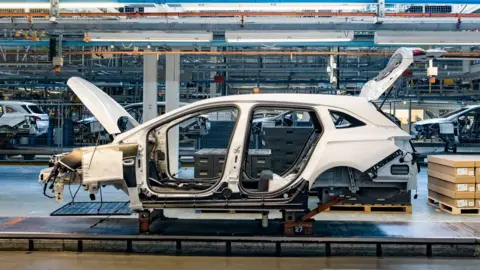The recent data from the United Kingdom’s automotive sector reveals a steep decline in car production for April, marking the lowest output for that month in over seventy years, excluding the unprecedented disruptions experienced during the Covid-19 lockdown. In April 2025, only 59,203 vehicles were produced, which represents a significant 16% drop compared to the same month in the previous year, and a staggering 25% decrease from March 2025. The Society for Motor Manufacturers and Traders (SMMT) has highlighted key factors contributing to this downturn, including tariffs and the interaction of holiday scheduling, particularly the timing of Easter, which led to fewer working days in the month.
The SMMT indicates that the existing shift within the automotive industry from traditional petrol vehicles to electric vehicles (EVs) has also played a role in decreasing the output. This transitional phase includes complexities that temporarily hinder manufacturing efficiency. One notable aspect is that the ongoing adaptations in manufacturing processes are coinciding with the evolving nature of consumer preferences and regulatory requirements surrounding EVs. However, there is a glimmer of hope for the industry, as the SMMT noted potential for recovery due to new trade agreements formed with markets such as the US, the European Union, and India.
These trade agreements could facilitate increased production levels in the near future, although the immediate past remains bleak. The record lows for April production also tie back into deeper trends affecting global automotive markets. The downward trajectory isn’t isolated to the UK; similar contractions in vehicle output are being reported across several major automotive manufacturing countries including Germany, Italy, France, and Japan. According to Professor Peter Wells, director of the Centre for Automotive Industry Research based at Cardiff University, this broader context affirms that the fluctuations in the UK are part of a larger global reality that the automotive industry is grappling with.
April’s decline in vehicle manufacturing highlights a broader systemic risk primarily related to weak demand from the UK’s largest markets, specifically the US and the European Union. The recent figures indicate that production aimed at export has slumped by 10.1%, which raises concerns about future sustainability for UK automotive manufacturers. The total vehicle output recorded in the first four months of 2025 marks the lowest since 2009, pointing to a significant contraction in an industry that is facing mounting competitive pressures and evolving marketplace dynamics.
The SMMT also points out specific historical context – previous low production figures outside of the pandemic occurred in 1952, a year in which just 53,517 vehicles were manufactured within the same constraints. The context of current production challenges is exacerbated by the trade policies that shape international commerce, including tariffs and regulatory environments that must be navigated by car manufacturers. In recent months, the UK government’s policy shift regarding support for EV manufacturing has contributed to an uncertain environment for producers. This uncertainty has led to difficulties in long-term planning, a concern highlighted by various automotive industry stakeholders.
In April, the UK government introduced plans to ease sales targets for EVs and to lower penalties for non-compliance with certain emissions regulations. These adjustments reflect a significant shift in approach but also introduce further uncertainty amid an already turbulent landscape. Traditionally, stability and clear guidance on policy matters—whether concerning tariffs, electrification, or broader industry standards—are what automotive benefactors crave to ensure sustainable growth and development. Industry experts like Professor Wells opine that the contemporary landscape remains volatile and unpredictable, complicating manufacturers’ ability to thrive amid these transitions.
The UK automotive industry, significantly affected by the convergence of domestic policy changes and international market dynamics, faces a pivotal moment that could reshape its trajectory in the coming years. With major companies such as Honda and Ford already having shut down production facilities in the UK, the road ahead requires strategic maneuvering backed by strong policies to bolster resilience and competitive capability.










